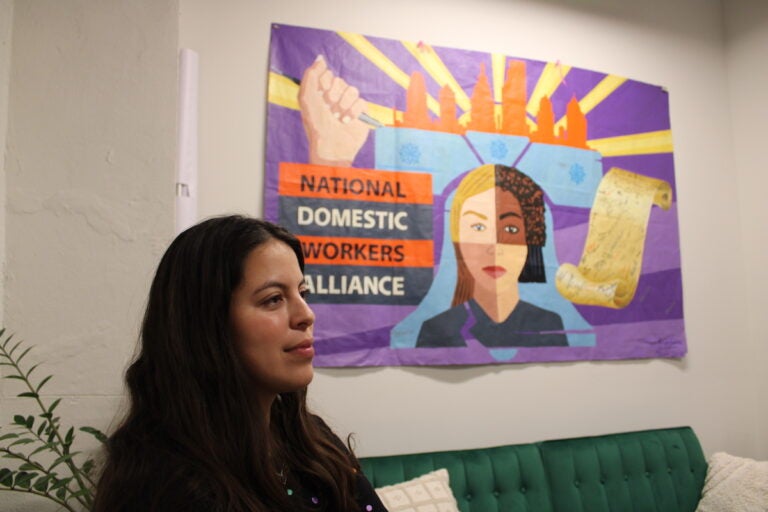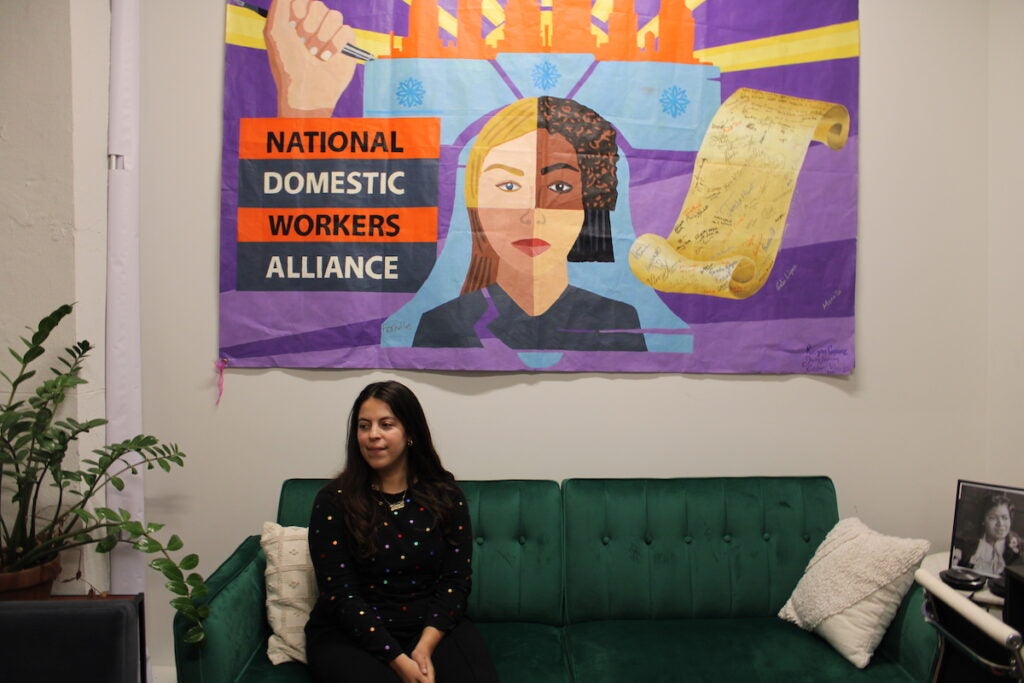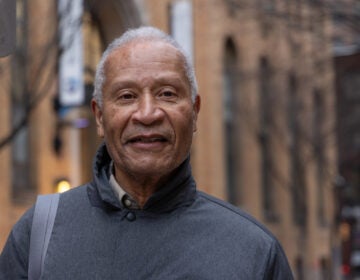Philly workers coalition pushes for stronger retaliation legislation, better funding for Office of Worker Protections in 2024
Councilmember Kendra Brooks, organizers, and workers say the proposal is needed to strengthen enforcement of the city’s existing labor laws.
Listen 1:22
Aurora Muñoz, organizing manager of the Pennsylvania chapter of the National Domestic Workers Alliance, says a proposal for new anti-retaliation legislation is critical for ensuring labor protections for workers throughout Philadelphia. (Emily Neil/WHYY)
From Philly and the Pa. suburbs to South Jersey and Delaware, what would you like WHYY News to cover? Let us know!
When the Philadelphia Domestic Workers Bill of Rights passed in 2019, workers and advocates celebrated it as a landmark win for an industry that has historically been left out of existing labor protections.
But after the law went into effect and workers began exercising their newly protected rights, some of the estimated 16,000 house cleaners, nannies, and caregivers who live in the city began sharing stories of retaliation. Many said they were dismissed after asking their employer for a contract — a key component of the Bill of Rights legislation. Others said they were denied things like guaranteed lunch breaks. Some who filed complaints with the city’s Office of Worker Protections said they waited up to six months to hear back from investigators. In the meantime, the lost wages or time remained unredressed.
Out of those conversations, members of the Pennsylvania Domestic Workers Alliance’s organizing committee began to question what needed to change to protect their rights in the workplace — a mission shared by temp workers, restaurant employees, and workers in many other industries throughout the city.

Aurora Muñoz, organizing manager for the Pennsylvania chapter of the National Domestic Workers Alliance, says a new bill on deck to be introduced to City Council in early 2024 is a direct result of those worker-led solutions.
“This law is really to strengthen existing labor protections that Philadelphia residents have, workers have, and also to create new mechanisms to protect workers against retaliation,” Muñoz said. “So currently … there are really amazing laws in the books, but many of them cannot be achieved fully because workers have had backlash, retaliation, when trying to defend those laws.”

The PDWA, Community Legal Services, Temple University Law School’s Sheller Center for Social Justice, the Philly Black Worker Project, El Comité de Trabajadores de Restaurantes, and other workers’ rights groups are working together to draft the bill. Councilmember Kendra Brooks is the prime sponsor.
The proposal is still in the draft stage, so details are not finalized, but Muñoz said a central component will include calling for increased funding for the city’s Office of Worker Protections, which investigates workplace violation complaints.
Another key objective is increasing penalties for employers who violate employees’ rights.
“If I steal $12 from you, the only thing that I have to do, if you put in a claim, if you go take me to court, is just give your $12 dollars back. There’s no incentive for me not to do that again. And the worker put a ton of effort on their part to go to court to file a claim,” Muñoz said.
“So we want those penalties to be higher so that there’s remedies for workers who are affected,” she said.
Eric Schulz, communications director for the city’s Office of Worker Protections, said there are existing penalties for employers who violate labor laws, of up to $2,000 for a class 3 offense, which includes retaliation, as stipulated in the Domestic Worker Bill of Rights. Schulz also noted that determinations can include translation fees, therapy fees, or other expenses the employee incurs in the course of submitting a complaint.

Rhiannon DiClemente, a supervising attorney at Community Legal Services who is working on the proposal, said the Office of Worker Protections currently has about one investigator per every 200,000 people in Philadelphia — a ratio that makes it difficult for the office to work through complaints and ensure that violations are addressed in a thorough and timely manner.
“There needs to be, on the back end, strong enforcement of the laws by the Office of Worker protections, which requires making sure that office has funding and has the resources and tools needed to investigate and adjudicate complaints,” she said.
Schulz said that the average time the Office of Worker Protections has taken to respond to a complaint related to the Domestic Worker Bill of Rights in the last two years was less than 40 days, and the longest that a complainant waited to hear back from the office was 98 days.
DiClemente said enforcing labor legislation the city has passed in recent years — like the Domestic Workers Bill of Rights, Fair Work Week legislation, and the city’s Wage Theft Ordinance — is complicated by “pervasive retaliation” against workers who file complaints with the office. And even for those workers who file a complaint and receive a determination in their favor from the Office of Worker Protections, the outcome isn’t always clear. Employers will often ignore determinations and refuse to pay what is owed to the worker, DiClemente said.
“What we want to make sure is that there’s clear language in the law that gives [the Office of Worker Protections] the power to enforce their determinations, that gives them power to enforce penalties against employers who are retaliating against workers or who are found to have violated the law and are not complying with determinations,” she said.
Schulz said currently, over 90% of employers are brought into compliance by the office without going to court, and the office has taken the remaining cases to court to ensure the complainant received the funds they’re owed. In cases related to the Domestic Worker Bill of Rights, Schulz said to date, every determination has resulted in compliance so that complainants receive the money they’re owed.
Other components of the proposal include establishing a “Quick Strike” task force unit within the Office of Worker Protections to respond quickly to urgent cases of retaliation; giving the Office of Worker Protections greater authority to collect money owed to workers; hosting workshops to educate employers and employees about their rights and obligations; increasing advertising for know-your-rights resources; and free mental health resources for workers who have suffered workplace abuse.
Councilmember Brooks, a former domestic worker and “proud member” of the Domestic Workers Task Force, said she plans to introduce the new proposal to City Council in early 2024 because the new legislation stands to build on the city’s existing labor laws.
“I believe that we have really moved some great legislation around protecting workers here in Philadelphia. But that legislation is not being enforced properly,” she said. “We need to make sure that we’re keeping our promise that we’ve made to workers with our legislation around worker protections.”
Muñoz said organizers also met with Councilmembers Jamie Gauthier, Katherine Gilmore Richardson, Mark Squilla, and Isaiah Thomas, who have expressed support for the proposal.
For domestic workers or other workers interested in learning more about the proposal, they can contact Aurora Muñoz and the PDWA via email at amunoz@domesticworkers.org, or by phone at 267-422-1103.
Editor’s note: This article has been updated to include information from the Office of Worker Protections.
WHYY is your source for fact-based, in-depth journalism and information. As a nonprofit organization, we rely on financial support from readers like you. Please give today.







